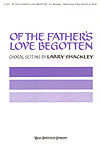- |
User Links
Of the Father's Love Begotten
Hymn Information
- First Line
- Of the Father's love begotten
- Author
- Marcus Aurelius Clemens Prudentius, 348-413
- Text Source
- Tr. composite
- Tune Name
- DIVINUM MYSTERIUM
- Arranger
- Paul G. Bunjes, 1914-1998
- Tune Source
- Plainsong mode V, 13th c.
- Topic
- Church Year: Christmas · Doxologies · Jesus Christ: King
Copyright Information
- Text Copyright
- Public Domain
- Tune Copyright
- Arr. © 1982 Concordia Publishing House
- Reprint/Projection Information
- Words: The Words are in the Public Domain; you do not need permission to project or reprint the Words.
- Music: Permitted with a license from CCLI.com or from OneLicense.net. If you do not own one of these licenses, please contact the copyright holder for permission.
Full Text
Scripture References
Thematically related:
- st. 1 = · · · ·
- st. 2 = · · ·
- st. 3 =
- st. 4 = ·
Further Reflections on Scripture References
This hymn, with very ancient roots, is a confession of faith about the Christ, the eternal Son of God, whose birth and saving ministry were the fulfillment of ancient prophecies (st. 1-3). The final stanzas are a doxology inspired by John's visions recorded in Revelation 4-7 (st. 4-5). The text is based on "Corde natus ex parentis," a Latin poem by Marcus Aurelius C. Prudentius (b. Saragossa [?], Northern Spain, 348; d. c. 413).
Psalter Hymnal Handbook
Confessions and Statements of Faith References
Further Reflections on Confessions and Statements of Faith References
God’s “fierce love” referred to in Our World Belongs to God, paragraph 5 is the power behind the scenes in this song.
In stanza 2, this song, like Heidelberg Catechism, Question and Answer 35, explains the conceiving of Christ by the Holy Spirit: the eternal Son of God took a truly human nature to himself “through the working of the Holy Spirit from the flesh and blood of the virgin Mary.”
This hymn concludes with a doxology of praise for all three members of the Trinity who were involved in the incarnation. Heidelberg Catechism, Lord’s Day 12, Question and Answer 31 captures the role of each when it professes that Christ is called anointed, because he has been “ordained by God the Father and has been anointed with the Holy Spirit” to be our prophet, priest, and king.
Of the Father's Love Begotten
Words of Praise
Assurance
Additional Prayers
Of the Father's Love Begotten
Tune Information
- Name
- DIVINUM MYSTERIUM
- Key
- E♭ Major


 My Starred Hymns
My Starred Hymns







